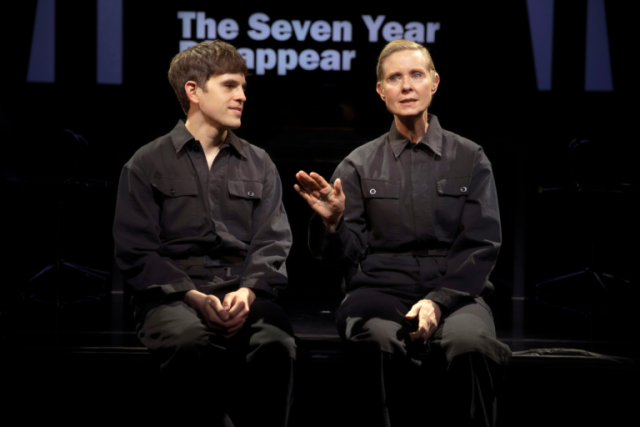
Theatrical productions are like collaborative jigsaw puzzles. When the pieces—script, acting, direction, design, etc.—fit perfectly together, you have a genuine, amazing experience. But sometimes you get some extremely well-done and satisfying pieces, but they don’t quite line up or they are matched with lesser elements and the whole is less than scintillating. You walk out with a sense that something vital is missing, and you can’t put your finger on what was lacking.
That’s the case with The Seven Year Disappear, Jordan Seavey’s creative and occasionally gripping two-character piece presented by The New Group at the Signature Center. The piece has fine acting, imaginative direction, and some sizzling writing, but Seavey’s central intent or theme is unclear.
Disappear follows the dysfunctional relationship between self-centered performance artist Miriam and her gay son Naphtali who is also her business manager. Just as Miriam is about to accept a prestigious commission from the Museum of Modern Art, she pulls the titular vanishing act and remains off the grid, even to her son, for seven years. After a spiral of political disillusion, drug and alcohol abuse, and numerous disastrous affairs (including one with Miriam’s former lover Wolfgang), Naphtali finally seems to have his life back together, just barely. But Miriam comes crashing back on the scene, pulling her son back into her whirlpool of entitlement and narcissism, all in the name of her art.
Seavey hopscotches back and forth in the timeline, tracing the strained union between mother and son as Miriam exploits the people in her life for her work and Naphtali attempts to establish his own identity. In addition to vivifying the larger-than-life Miriam, Cynthia Nixon plays all the other parts, switching genders and sexualities with dexterity and conviction. She creates a galaxy of diverse personalities from an insecure, sexually ambiguous manicurist to a vacuous actress friend to the domineering Wolfgang. Taylor Trensch is equally adept at conveying the varying stages of Nephtali’s unraveling. In one scene, he’s confident and charismatic like his mom, in the next he’s a sobbing drunken mess. Dressed by Qween Jean in utilitarian black costumes so they can assume multiple personae, the pair play off each other beautifully.
Director Scott Elliott keeps things moving quickly and smoothly. Each scene is briskly paced and contains a beginning, middle and climax. Transitions are handled cleanly. He also makes the time of each scene clear with the aide of Derek McLane’s simple set and John Narun’s projections which give us the date of each vignette and where it fits in the timeline. Narun’s videos and projections add texture. Seavey delivers numerous touching and scorching scenes for two, but he never completely clarifies the motive behind Miriam’s absence or the message behind her work.
The dynamic between artistic expression and personal bonds appears to be the central theme, but Seavey’s stand on the issues is not clear. Also we don’t learn a great deal about Miriam or her art, so it’s hard to care about her life or career. We do learn about Naphtali’s struggle and Trensch’s sensitive performance helps, but there is still a gaping hole in the middle of this otherwise compelling piece.
